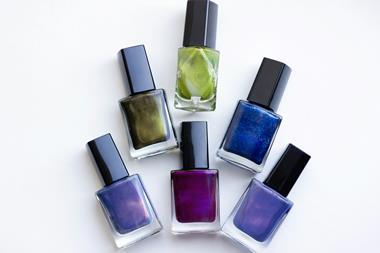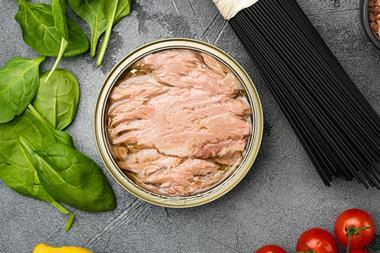In the second of our On the Up series, Elaine Watson finds out how Stephen Moon had a hit on his hands with Altú
In a climate where the nation’s expanding waistline is hitting the headlines on a daily basis, selling products that taste nice but don’t take three hours at the gym to work off afterwards has to be a good bet.
If some of the products hitting the market lately have got the health lobby reaching for their red traffic light stickers, Stephen Moon’s products get the green light every time, with enough fruit to satisfy any Department of Health inspector and not a trace of hydrogenated fat or refined sugar.
And encouragingly for Moon, who kissed goodbye to a well-paid job and pumped large amounts of his own cash into a start-up called Nutrinnovator, consumers have proved more than willing to pay a premium for products they can enjoy and feel virtuous about at the same time.
The Nutrinnovator story began in February 2003 when Moon, a director at GlaxoSmithKline’s nutritional healthcare division, left to set up his own business.
“At that stage I had no product and no money,” says Moon, who has also held senior roles at BP, Dalgety and Quaker. “But I had been thinking since 2002 that there was an opportunity for a small, agile company to get things to market quickly. I had been looking at the wellbeing market here and the cereal bar market in the US and had seen huge opportunities for a healthy premium product as most of the stuff on the market was effectively confectionery - high in fat and refined sugar. The challenge was to make a cereal bar using a fruit puree-based sweetener and low levels of added sugar that didn’t taste like sawdust.”
While he still didn’t have any cash, he did have contacts. Convinced he had found a gap in the market, he hit the phones.
The first call was to Thornton Mustard, a taste expert with a client list that reads like a who’s who of branded companies from Coca-Cola and Mars to Diageo and Danone.
Next was Welsh snack foods manufacturer Halo Foods followed by consultant Seachange Creative. So far, so good. Seachange would design the packaging, Halo would make the products and Mustard would ensure they tasted good.
The question of who would stump up the cash proved tougher, says Moon. “We talked to the venture capitalists, but in the end the money came from a group of business angels who gave us £1m for year one.”
With fellow GSK executives Fiona Vigar and Jonathan Salisbury on board and extensive consumer research completed, Nutrinnovator was ready to talk to retail buyers in autumn 2003 about its first product - Altú, a nutrition bar. The bars come in four flavours: cranberry and boysenberry; blueberry, yoghurt and honey; peach, apricot and almond; and Thai sweet chilli, peanut and cashew.
Buyers, says Moon, are interested in three things. “Yes, they are very receptive to health, innovation and wellbeing and yes, anxiety about obesity is up exponentially. But what they really want to know is: are you bringing something genuinely different to a crowded marketplace? Can you grow the whole category and can you give them a decent margin and support your product?
“In the next few weeks, for example, we are pumping £250,000 into full-page ads in broadsheets, women’s mags, instore promotions, outdoor PR and sampling.”
Buyers were impressed. Listings rapidly followed in WHSmith Travel, Sainsbury, some wholesalers, Superdrug and Waitrose.
With a successful product already on the market and a range of others in the pipeline, more cash was needed to take things to the next level, said Moon, who has just raised another £400,000 in debt and £1.7m from floating some of the company’s shares on the Alternative Investment Market.
Next to market will be Altú Black, a premium cola with 30% less sugar than regular cola and no artificial sweeteners, which is currently in soft launch phase. “Diet colas taste awful and standard ones are full of sugar,” says Moon. “We wanted to make a premium product that tastes great without the sugar. Cola is a £3bn market in the UK, so we’d definitely like a bit of that.”
Altú Black will be rapidly followed by a fruit version, Altú Amber, a sports drink called Altú Active and another premium food product being kept tightly under wraps until early next year, says Moon. “We’re trying to patent the process at the moment - all I can say is it’s something quite different.”
After that, the focus will be on products containing functional ingredients, plus products that can deliver daily doses of prescription medicines and nutrients, vitamins and minerals.
Healthy products for kids also represent a big opportunity, as does a move into the US, he says, which is lapping up products in wellbeing.
“In five years’ time I’d like us to be a company of reasonable size with an international profile regarded as the best in its field for wellbeing and innovation.”
Moon did not set up Nutrinnovator in order to sell it on and jet around the world on the proceeds, he insists. “This is the rest of my career. I didn’t get into this just to sell again in three years. I’ve always wanted to run my own business. It’s just like they say. The lows might be lower, but the highs are definitely higher.”
In a climate where the nation’s expanding waistline is hitting the headlines on a daily basis, selling products that taste nice but don’t take three hours at the gym to work off afterwards has to be a good bet.
If some of the products hitting the market lately have got the health lobby reaching for their red traffic light stickers, Stephen Moon’s products get the green light every time, with enough fruit to satisfy any Department of Health inspector and not a trace of hydrogenated fat or refined sugar.
And encouragingly for Moon, who kissed goodbye to a well-paid job and pumped large amounts of his own cash into a start-up called Nutrinnovator, consumers have proved more than willing to pay a premium for products they can enjoy and feel virtuous about at the same time.
The Nutrinnovator story began in February 2003 when Moon, a director at GlaxoSmithKline’s nutritional healthcare division, left to set up his own business.
“At that stage I had no product and no money,” says Moon, who has also held senior roles at BP, Dalgety and Quaker. “But I had been thinking since 2002 that there was an opportunity for a small, agile company to get things to market quickly. I had been looking at the wellbeing market here and the cereal bar market in the US and had seen huge opportunities for a healthy premium product as most of the stuff on the market was effectively confectionery - high in fat and refined sugar. The challenge was to make a cereal bar using a fruit puree-based sweetener and low levels of added sugar that didn’t taste like sawdust.”
While he still didn’t have any cash, he did have contacts. Convinced he had found a gap in the market, he hit the phones.
The first call was to Thornton Mustard, a taste expert with a client list that reads like a who’s who of branded companies from Coca-Cola and Mars to Diageo and Danone.
Next was Welsh snack foods manufacturer Halo Foods followed by consultant Seachange Creative. So far, so good. Seachange would design the packaging, Halo would make the products and Mustard would ensure they tasted good.
The question of who would stump up the cash proved tougher, says Moon. “We talked to the venture capitalists, but in the end the money came from a group of business angels who gave us £1m for year one.”
With fellow GSK executives Fiona Vigar and Jonathan Salisbury on board and extensive consumer research completed, Nutrinnovator was ready to talk to retail buyers in autumn 2003 about its first product - Altú, a nutrition bar. The bars come in four flavours: cranberry and boysenberry; blueberry, yoghurt and honey; peach, apricot and almond; and Thai sweet chilli, peanut and cashew.
Buyers, says Moon, are interested in three things. “Yes, they are very receptive to health, innovation and wellbeing and yes, anxiety about obesity is up exponentially. But what they really want to know is: are you bringing something genuinely different to a crowded marketplace? Can you grow the whole category and can you give them a decent margin and support your product?
“In the next few weeks, for example, we are pumping £250,000 into full-page ads in broadsheets, women’s mags, instore promotions, outdoor PR and sampling.”
Buyers were impressed. Listings rapidly followed in WHSmith Travel, Sainsbury, some wholesalers, Superdrug and Waitrose.
With a successful product already on the market and a range of others in the pipeline, more cash was needed to take things to the next level, said Moon, who has just raised another £400,000 in debt and £1.7m from floating some of the company’s shares on the Alternative Investment Market.
Next to market will be Altú Black, a premium cola with 30% less sugar than regular cola and no artificial sweeteners, which is currently in soft launch phase. “Diet colas taste awful and standard ones are full of sugar,” says Moon. “We wanted to make a premium product that tastes great without the sugar. Cola is a £3bn market in the UK, so we’d definitely like a bit of that.”
Altú Black will be rapidly followed by a fruit version, Altú Amber, a sports drink called Altú Active and another premium food product being kept tightly under wraps until early next year, says Moon. “We’re trying to patent the process at the moment - all I can say is it’s something quite different.”
After that, the focus will be on products containing functional ingredients, plus products that can deliver daily doses of prescription medicines and nutrients, vitamins and minerals.
Healthy products for kids also represent a big opportunity, as does a move into the US, he says, which is lapping up products in wellbeing.
“In five years’ time I’d like us to be a company of reasonable size with an international profile regarded as the best in its field for wellbeing and innovation.”
Moon did not set up Nutrinnovator in order to sell it on and jet around the world on the proceeds, he insists. “This is the rest of my career. I didn’t get into this just to sell again in three years. I’ve always wanted to run my own business. It’s just like they say. The lows might be lower, but the highs are definitely higher.”













No comments yet